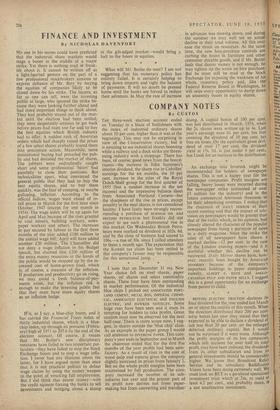COMPANY NOTES
By CUSTOS THE three-week election account ended on Tuesday in a blaze of bullishness with the index of industrial ordinary shares about 10 per cent, higher than,it was at the beginning. This may not be surprising in view of the Conservative victory, but it is amazing to see industrial shares booming while a railway and a dock strike are threat- ening industry with a stoppage. There has been, of course, good news from the board- rooms—the increase in John Summers's interim dividend, the sharp rise in Colvilles' earnings for the six months, the 10 per cent, increase in the sales of the Royal Dutch-Shell group for the first quarter of 1955 (but a modest increase in the net income) and the impressive balance sheet from Associated Portland Cement—but the sharpness of the rise in prices, except possibly in the steel shares, is not considered healthy. I have lately been strongly recom- mending a purchase of BURMAH OIL and BRITISH PETROLEUM but' frankly did not expect to see such a phenomenal rise in this market. On Wednesday British Petro- leum were marked ex dividend at 102s. 6d. and by the close of business had soared to 106s.—a rise of 30s. since I called attention to them a month ago. The expectation that the Kuweit tax claim has been settled in this company's favour may be responsible for this sensational jump.
I note that on December 31 my New Year choice fell on steel shares, paper shares, oil shares and select commodity shares. These four have been outstanding in market performance. Of the industrial blue chips I picked out ASSOCIATED PORT- LAND CEMENT, METAL BOX, IMPERIAL CHEMI- CAL, ASSOCIATED ELECTRICAL and ENGLISH ELECTRIC, and HAWKER SIDDELEY. Some huge rises have been seen and it must be tempting for holders to take profits. Great caution must now be observed for the next half-year. There is more scope now, I sug- gest, in shares outside the 'blue chip' class. As an example in the paper group I would call attention to INVERESK PAPER. This com- pany's year ends in September and in March the chairman stated that for the first five months of the year profits had been satis- factory. As a result of rises in the cost of wood pulp and esparto grass the company slightly increased its prices from January 1. But on the whole profit margins have been maintained by full production. The com- pany increased the number of its sub- sidiaries last year and the greater part of its profit now derives not from paper- making but from converting and merchan-
.
dising. A capital bonus of 100 per cent. was last distributed in March, 1954, when the 2s. shares were written up to 4s. Last year's earnings were 61 per cent, tax free covering the dividend of 10 pe,r cent. ta,x free six times. On the equivalent gross divi. dend of over 17 per cent, the dividend yield at 17s. 9d. is just under 4 per cent., but I look for an increase in the distribution An exchange into lnveresk might be recommended for holders of newspaper shares. This is not a happy year for the newspaper companies. Profit margins are falling, heavy losses were incurred during the newspaper strike (estimated at over £3 million for the industry) and in the future commercial television threatens to hit their advertising rcvehues. I notice that the chairman of DAILY MIRROR at their recent meeting said that the impact of tele vision on newspapers would be greater than that of the radio, which, in his opinion, had already altered the character of the popular newspaper from being a purveyor of news to a daily magazine. Since the strike the sales of all newspapers have shown a marked decline-12 per cent. in the case of the London evening papers—and it is doubtful whether this decline can be recovered. Daily Mirror shares have, how ever, recently been bought by American investors because of the company's important holdings in paper companies namely, ALBERT E. REED and ANGLO CANADIAN PULP AND PAPER MILLS. I suggest this is a good opportunity for an exchange from parent to child.
' BRITISH ELECTRIC TRACTION declares its final dividend for the year ended last March on or about the middle of this month. When the directors distributed their 200 per cenl • scrip bonus last year they stated that they expected to be able to declare a dividend of not less than 20 per cent, on the enlarged deferred ordinary capital. But I would not be surprised if it were more. Although the profit margins of its bus companie: which still account for over half its total profit, may have been reduced, the dividends from its other subsidiaries and from its general investments should be considerably higher. We know that Broadcast RclaY Service and its subsidiary Rediffusion Vision have been doing extremely well. We must look on BET as a go-ahead specialised investment trust which at 24s. to yield a I least 4.2 per cent., and probably more, is a not unattractive investment.










































 Previous page
Previous page